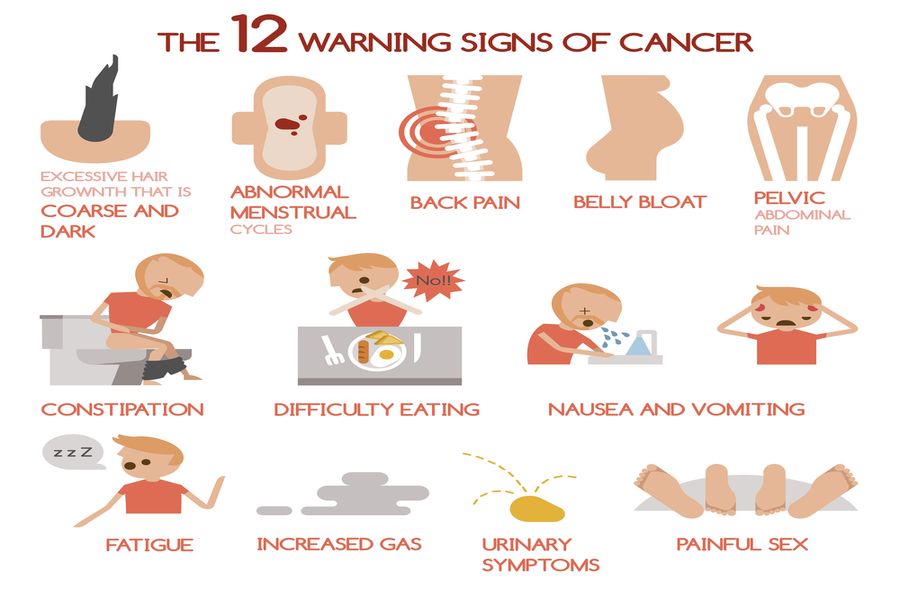Cancer is a genetic disease caused by changes to genes that control cells function, especially how they grow and divide. Unexplained weight loss, fever, fatigue, skin changes, unusual immune system reactions, brain, and nervous system problems, chemical changes in your body, unusual bleeding or discharge etc are Symptoms of any kind of cancer.
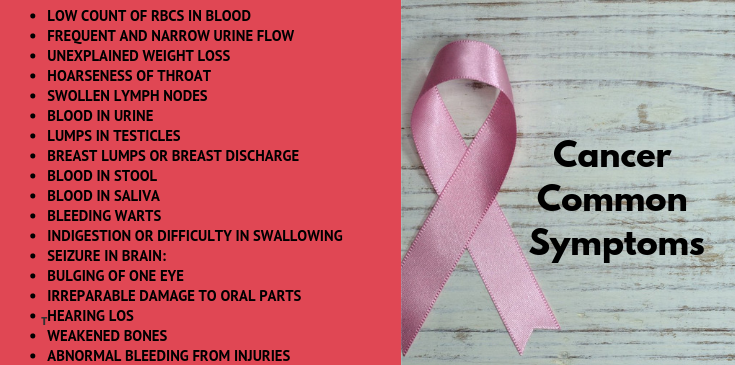
Other symptoms :
These are the common symptoms with cancer, but there are many other symptoms that are not listed here.
Consult your doctor if you find any major changing in your body and lasts more than two weeks.
What is Cancer?
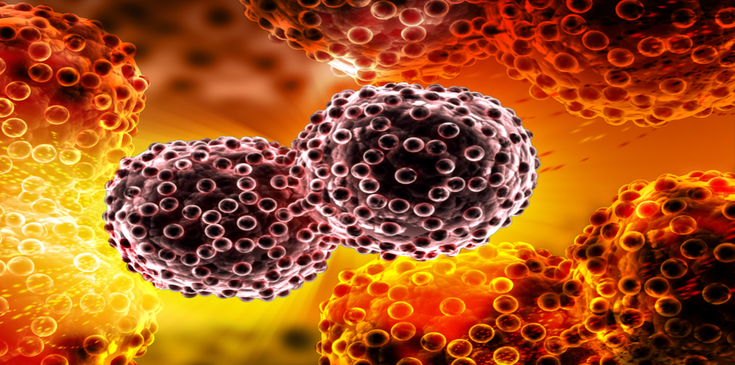
Cancer is the name of a group of many related diseases. Cancer is linked to the cell, In every form of Cancer body’s cell do not grow normal but spread very fast. Cells start to divide without stopping(uncontrolled way) and spread into surrounding tissues.
Your body is made up with trillions of cells, Cancer can occur anywhere in the body of a human. In normal, about 300 Million Cell dies in your body every minute, when cells grow old or become damaged or exhausted, they die, and new Cells grow and divide to form new cell as to replace dead or damaged Cell.
In Cancer, Cells become more abnormal, old or damaged cells survive when they should die and new Cells form when they are not needed. Cells continue to grow without stopping and form growths called tumors.
Most cancers form solid tumors, which are masses of tissue. Cancers of the blood, generally do not form solid tumors, such as leukemias. Cancerous tumors are malignant.
Sometimes cancer cells break away from the original tumor and travel to other parts of the body, where they keep growing and can go on to form new tumors. This is how cancer spreads. The spreading of a tumor to a new place in the body is called metastasis.
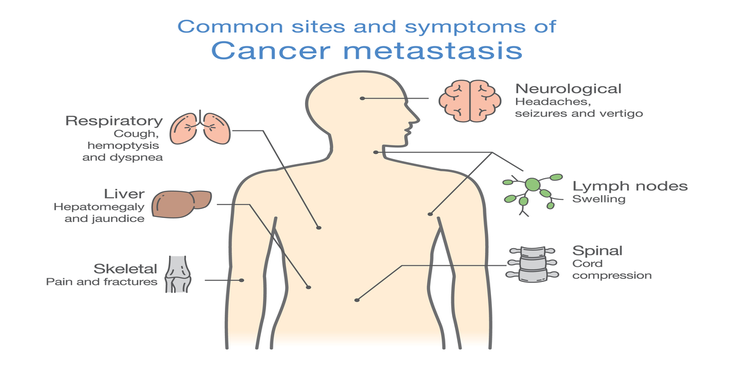
How Cancer Occurs?
Cancer is a genetic disease caused by changes to genes that control cells function, especially how they grow and divide.
Genetic changes that cause cancer could be inherited from our parents. Genetic changes also arise during a person’s lifetime as a result of errors that occur as cells divide or because of damage to DNA caused by some environmental exposures. Cancer-causing environmental exposures include substances, such as the chemicals in tobacco smoke, and radiation, such as ultraviolet rays from the sun and Pesticides, fertilizers etc.
We should keep in mind, though, that in the majority of cancer cases we cannot attribute the disease to a single cause.
We can generally divide cancer risk factors into the following groups:
Lifestyle-related some factors that cause cancer include:
• tobacco
• alcohol
• UV radiation in sunlight
• some food-related factors, such as nitrites and polycyclic aromatic hydrocarbons (PAHs) generated by barbecuing food).
Cancer-causing some factors related to our working and living environments include:
• asbestos fibers
• tar and pitch
• polynuclear hydrocarbons (e.g. benzopyrene)
• Some metal compounds
• Some plastic chemicals (e.g. Vinyl chloride)
Bacteria and viruses can cause cancer:
• Helicobacter pylori (H. pylori, which causes gastritis)
• HBV, HCV (hepatitis viruses that cause hepatitis)
• HPV (human papillomavirus, papillomavirus, it is a viral infection which causes changes eg. Cervical cells).
Radiation can cause cancer:
• ionizing radiation (e.g. X-ray radiation, soil radon)
• non-ionised radiation (the sun’s ultraviolet radiation)
Some drugs may increase the risk of cancer:
• certain antineoplastic agents
• certain hormones
• medicines that cause immune deficiency
Also read about
Statistics on Cancer :
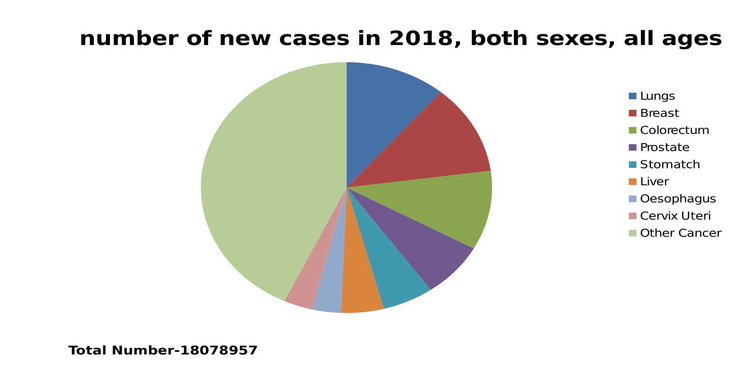
Common Cancer Types
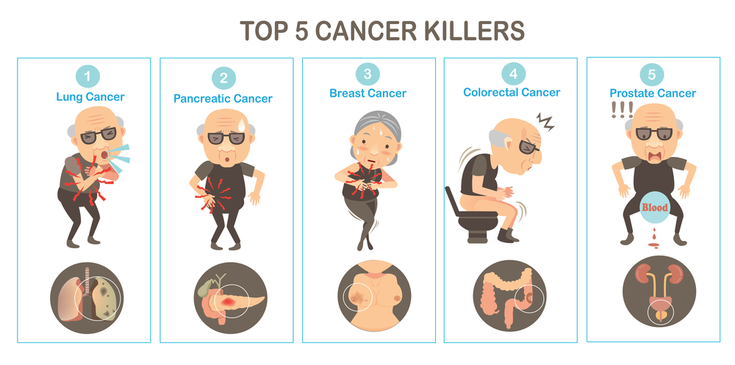
- Breast Cancer
- Lung Cancer
- Pancreatic Cancer
- Colorectal Cancer
- Prostate Cancer
All types of Cancer :
Adenoid Cystic Carcinoma
Adrenal Gland Tumor
Amyloidosis
Anal Cancer
Appendix Cancer
Astrocytoma – Childhood
Ataxia-Telangiectasia
Beckwith-Wiedemann Syndrome
Bile Duct Cancer (Cholangiocarcinoma)
Birt-Hogg-Dubé Syndrome
Bladder Cancer
Bone Cancer
Brain Stem Glioma – Childhood
Brain Tumor
Breast Cancer
Breast Cancer – Inflammatory
Breast Cancer – Metastatic
Breast Cancer in Men
Carcinoid Tumor
Carney Complex
Central Nervous System Tumors – Childhood
Cervical Cancer
Childhood Cancer
Colorectal Cancer
Cowden Syndrome
Craniopharyngioma – Childhood
Desmoplastic Infantile Ganglioglioma, Childhood Tumor
Ependymoma – Childhood
Esophageal Cancer
Ewing Sarcoma – Childhood and Adolescence
Eye Cancer
Eyelid Cancer
Familial Adenomatous Polyposis
Familial GIST
Familial Malignant Melanoma
Familial Non-VHL Clear Cell Renal Cell Carcinoma
Familial Pancreatic Cancer
Gallbladder Cancer
Gastrointestinal Stromal Tumor – GIST
Germ Cell Tumor – Childhood
Gestational Trophoblastic Disease
Head and Neck Cancer
Hereditary Breast and Ovarian Cancer
Hereditary Diffuse Gastric Cancer
Hereditary Leiomyomatosis and Renal Cell Cancer
Hereditary Mixed Polyposis Syndrome
Hereditary Pancreatitis
Hereditary Papillary Renal Carcinoma
HIV/AIDS-Related Cancer
Juvenile Polyposis Syndrome
Kidney Cancer
Lacrimal Gland Tumor
Laryngeal and Hypopharyngeal Cancer
Leukemia – Acute Lymphoblastic – ALL – Childhood
Leukemia – Acute Lymphocytic – ALL
Leukemia – Acute Myeloid – AML
Leukemia – Acute Myeloid – AML – Childhood
Leukemia – B-cell Prolymphocytic Leukemia and Hairy Cell Leukemia
Leukemia – Chronic Lymphocytic – CLL
Leukemia – Chronic Myeloid – CML
Leukemia – Chronic T-Cell Lymphocytic
Leukemia – Eosinophilic
Li-Fraumeni Syndrome
Liver Cancer
Lung Cancer – Non-Small Cell
Lung Cancer – Small Cell
Lymphoma – Hodgkin
Lymphoma – Hodgkin – Childhood
Lymphoma – Non-Hodgkin
Lymphoma – Non-Hodgkin – Childhood
Lynch Syndrome
Mastocytosis
Medulloblastoma – Childhood
Melanoma
Meningioma
Mesothelioma
Muir-Torre Syndrome
Multiple Endocrine Neoplasia Type 1
Multiple Endocrine Neoplasia Type 2
Multiple Myeloma
Myelodysplastic Syndromes – MDS
MYH-Associated Polyposis
Nasal Cavity and Paranasal Sinus Cancer
Nasopharyngeal Cancer
Neuroblastoma – Childhood
Neuroendocrine Tumor
Neuroendocrine Tumor of the Pancreas
Neurofibromatosis Type 1
Neurofibromatosis Type 2
Nevoid Basal Cell Carcinoma Syndrome
Oral and Oropharyngeal Cancer
Osteosarcoma – Childhood and Adolescence
Ovarian, Fallopian Tube, and Peritoneal Cancer
Pancreatic Cancer
Parathyroid Cancer
Penile Cancer
Peutz-Jeghers Syndrome
Pituitary Gland Tumor
Pleuropulmonary Blastoma – Childhood
Prostate Cancer
Retinoblastoma – Childhood
Rhabdomyosarcoma – Childhood
Salivary Gland Cancer
Sarcoma – Kaposi
Sarcoma, Soft Tissue
Sarcomas of Specific Organs
Skin Cancer (Non-Melanoma)
Small Bowel Cancer
Stomach Cancer
Testicular Cancer
Thymoma and Thymic Carcinoma
Thyroid Cancer
Tuberous Sclerosis Complex
Unknown Primary
Uterine Cancer
Vaginal Cancer
Von Hippel-Lindau Syndrome
Vulvar Cancer
Waldenstrom’s Macroglobulinemia
Werner Syndrome
Wilms Tumor – Childhood
Xeroderma Pigmentosum
Around 200 cancer types has been identified , some of them are listed here .
